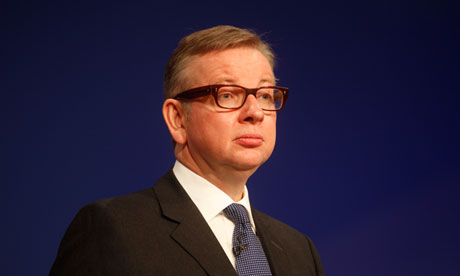Reforms expected to include eventual scrapping of A-level modules and introduction of dissertations of up to 5,000 words

Michael Gove's plans have been criticised by Labour, who say they ignore important subjects such as computing and engineering. Photograph: Gideon Mendel/Corbis
The education secretary, Michael Gove, is to shake up the A-level system as he moves to introduce the principles of the international baccalaureate (IB) to schools in England.
Students hoping to attend the elite Russell Group of universities will be expected to write dissertations of up to 5,000 words and to show an academic breadth of knowledge.
Anyone studying arts subjects, such as English and history, would be expected to choose a "contrasting" subject in the sciences or maths. Those studying the sciences would be expected to take a "contrasting" arts subject. The changes are designed to answer universities' complaints that too many students have a narrow outlook and often lack basic literacy skills.
Gove's latest move follows his announcement last month that he is to scrap GCSEs in favour of what he regards as a more academically rigorous English baccalaureate (EBacc) system.
In the next stage of reforms, Gove is not planning to scrap A-levels, but is hoping to drive up standards by developing an overall framework known as the ABacc. Students would still sit A-levels, but there would be major changes:
• It is expected that A-level modules would eventually be scrapped. Gove has done this with GCSEs and is minded to do so again with A-levels, though he is expected to move at a slower pace.
• Students would be stretched by being asked to write dissertations of up to 5,000 words. This would probably be in addition to their A-levels and would give them a higher overall ABacc grade. Many universities have complained that students often struggle to write longer essays.
Liz Truss, the new education minister who campaigned in favour of improving the teaching of maths in her days as a backbencher, has advocated longer essays.
While Gove is introducing the principles of the IB, he does not want to introduce the actual IB system across English schools, although it is favoured by many public schools. The qualification is managed from abroad and demands a breadth of subjects that would stretch many schools.
A Department for Education spokesman stressed that the plans, first disclosed in the Times, were at an early stage. "A-levels will not be replaced under any circumstances. There are public consultations about reforming A and AS-levels. There are also numerous suggestions about new ABacc league table measures but no decisions have been made." The Times said the mix would also include voluntary work.
Stephen Twigg, the shadow education secretary, said: "We support the concept of an ABacc. However, Labour would ensure it includes a broad range of subjects and sits alongside our proposed vocational courses. If these changes include community work, an extended project and a wider range of courses, then that is welcome.
"Unfortunately, Michael Gove seems to be ignoring important subjects like computing and engineering which are critical for the modern economy. The government must address the big challenges to ensure a One Nation education system – ensuring a gold standard route for vocational education and every pupil studying English and maths until the age of 18."
No comments:
Post a Comment